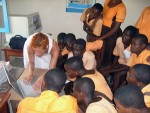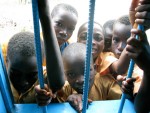Column Name
Title
Kopeyia, Ghana, is a place of some 2,000 inhabitants, a village with virtually no running water or electricity. A place that got its first school some 15 years ago, but where the majority of children will never leave the village or get a better education. A place where traditionally, the elderly get everything, and the children get leftovers, but where “everything” is very little. A place where one wakes up to the sounds of birds and drums. A place where music is an integral part of all activities. Where people still know the pleasures of simple things in life.
Body
I had been inspired and fascinated by African culture for years. At the suggestion of a percussionist friend, Jonathan Shapiro, I met Robert Levin, who co-founded the Kopeyia Ghana Basic School in 1988 with his teacher, the late drumming master Godwin Agbeli, who also founded the Dagbe Art Center in 1982. Since then, the Agbeli family has run the Dagbe Center, a magical place where one goes to study drumming, dancing, singing, and West African arts and crafts.
In spring 2009 I raised enough money through hosting benefit events to pay for my airfare to Accra, Ghana’s capital, and for my room, board, and drumming lessons at Dagbe for about a month. As soon as the 2008-09 academic year was over, I was on the plane.
The moment I set my foot on the cool asphalt of the shaded Dagbe patio, I knew this trip would change my life.
That afternoon I met with the Kopeyia Ghana Basic School headmaster and with other faculty to discuss the ways I could be of help at the school. The headmaster decided I should teach English three times a week, 35 minutes per class. “You have got to be kidding me,” my busy New York mind thought. “I have time. I have energy. I have a desire to help. I need more work!” But I didn’t say anything. One doesn’t talk like that in Kopeyia. I had already been laughed at because of the way I introduced myself to the headmaster. One doesn’t just extend one’s hand for a firm handshake. Instead, you must wait to be gestured to sit down, and then answer the headmaster’s questions politely. Two hours in Africa—I was learning quickly.
I started teaching the next day. The school had about 200 pupils. Two hundred darlings ranging from preschool to junior high, whom I couldn’t help but fall in love with immediately.
The classrooms had bare walls, worn-out floors, wooden desks, chairs, cabinets, and a blackboard. No electricity except for one classroom—a computer lab with one 7-year-old computer. The pupils were occasionally allowed to go to the computer lab to practice typing. They loved spending time there. That’s how I got the idea: I had my laptop with me. I had my microphone with me.
Why don’t I offer a class in music technology? That’s what I had been teaching for years at Juilliard. These children had so much musical talent and were singing, clapping, and drumming all the time! Why not show them how to record, arrange, and compose? How to preserve and share their talent with one another and the rest of the village? Maybe the neighboring village? All of Africa? The world?
I proposed my plan to the headmaster: I would teach music technology using my equipment, in between the classes, during breaks, and after school. It would be open to everyone but not mandatory. At the end of my stay I’d organize a public performance where the students would show their work.
The headmaster was excited but skeptical. “You mean … this month?” he asked. “Sure!” And it went from there. Over the next few weeks, the computer lab was filled with children with songs and smiles. We were composing, editing, arranging, and creating poetry with designed sound accompaniment. A few faculty members collaborated on projects. Some pupils wanted more music tech time, and they would visit me at Dagbe at dinnertime.
On Friday, June 19, at 9 a.m., it was show time. I rented sound equipment and hired personnel from the nearby village; the whole village was up early setting up the open-air stage on the school campus. It was a hot but dry day in the middle of the rainy season. “God is with us,” the headmaster said.
We presented a four-hour interdisciplinary performance that combined the work created in the music tech lab with dance numbers, poetry readings, skits, and dramatic sketches. An art exhibition of drawings was set up in an empty classroom. We had printed programs and flyers. The atmosphere was festive and there were no classes that day—just a big celebration of the art and culture of the children of Kopeyia.
Several days later it was time for me to go back home, which meant packing up my stuff and taking away what I’d offered to those children for one short month—the sweetness of their own art and their first music technology and stage experience.
I made a firm promise to the children, and to myself, that I would go back to Kopeyia Ghana Basic School and when I am back, I will bring the technology to set up a permanent music lab, and I will stay there to teach a full semester course. I will also teach Emmanuel, the computer teacher, to maintain the lab after my residency and carry on with the program.
That brings us to now. I am currently raising funds and collecting technology donations to keep my promise—I’ve named the project Give to Grow. My plan is to be on the plane to Accra in May. There is, of course, a lot more to tell, but I am already well over my word limit for this column. There was a whole other part to this trip—the wonderful training I received at the Dagbe Center. But in this article, just like in life itself, my own education had slipped to the second position, in favor of the education of those less fortunate than us.
For more information, visit milicagoestoghana.blogspot.com.






